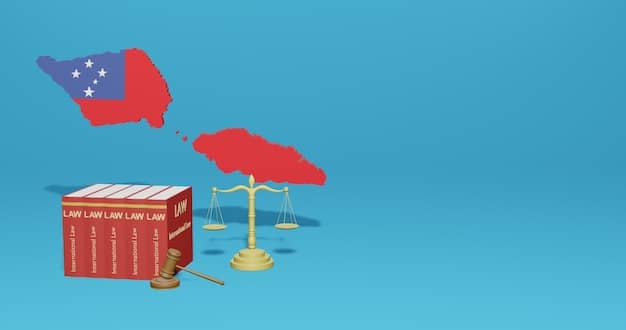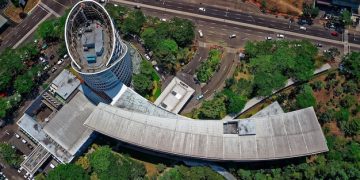Navigating New US Dual Citizenship Rules: A Guide for Peruvian-Americans (2026)

New US regulations for dual citizenship may impact Peruvian-Americans. Understanding these changes before 2026 is crucial for maintaining both US and Peruvian citizenship, affecting rights, responsibilities, and travel.
The landscape of US immigration and citizenship is constantly shifting, and understanding the nuances can be complex, especially for those holding dual citizenship. As 2026 approaches, new regulations regarding dual citizenship in the US may significantly impact Peruvian-Americans. This article aims to clarify these potential changes, offering guidance and practical advice for navigating this evolving legal terrain. The goal is to ensure that Peruvian-Americans are well-informed and prepared to protect their rights and privileges in both the US and Peru, particularly concerning the new US regulations for dual citizenship: What Peruvian-Americans Need to Know Before 2026.
Understanding Dual Citizenship: A Primer for Peruvian-Americans
Dual citizenship, or dual nationality, refers to an individual simultaneously holding citizenship in two countries. For Peruvian-Americans, this typically means possessing citizenship in both the United States and Peru. Understanding the basics of dual citizenship is the first step towards comprehending how new regulations might affect this status.
The concept of dual citizenship isn’t universally embraced, but many countries, including the US and Peru, recognize it. This recognition allows individuals to enjoy the rights and responsibilities of citizens in both nations. However, this also brings potential complexities related to taxation, legal obligations, and international travel.
Benefits of Dual Citizenship
Dual citizenship offers numerous advantages to Peruvian-Americans. These benefits can range from simplified travel and residency to enhanced economic and social opportunities.
- Simplified Travel: Dual citizens often enjoy streamlined travel between their two countries, without the need for visas or long-term residency permits.
- Economic Opportunities: Holding citizenship in both the US and Peru can unlock business and employment opportunities in both nations.
- Social Security Benefits: Dual citizens might be eligible for social security benefits in both countries, depending on specific agreements and contributions.
- Cultural Connection: Dual citizenship allows individuals to maintain a strong connection to their cultural heritage while fully participating in US society.
While dual citizenship offers numerous benefits, it’s essential to be aware of potential obligations, such as tax liabilities and legal responsibilities in both countries. These obligations are crucial to consider when assessing the overall impact of dual citizenship.

Key Aspects of US Citizenship Law and Peruvian-Americans
US citizenship law is complex, with various paths to citizenship, including birthright citizenship, naturalization, and derivative citizenship. For Peruvian-Americans, understanding how these laws intersect with Peruvian citizenship is crucial. It’s essential to recognize how changes in US regulations can specifically affect this demographic.
It’s also important to differentiate between US citizenship law and the specific immigration laws that apply to those seeking permanent residency or citizenship. Citizenship laws primarily concern the rights, duties, and status of individuals already recognized as US citizens. Immigration laws govern the process by which non-citizens can enter, reside, and eventually naturalize in the US.
Common Pathways to Dual Citizenship for Peruvian-Americans
Peruvian-Americans acquire dual citizenship through various means, often involving a combination of birthright and naturalization. Understanding these pathways helps contextualize the potential impact of new regulations. Here are the most common scenarios:
- Birthright Citizenship: A child born in the US to Peruvian parents automatically acquires US citizenship under the 14th Amendment. If Peru also recognizes citizenship through descent, the child may simultaneously acquire Peruvian citizenship.
- Naturalization: A Peruvian citizen who becomes a naturalized US citizen can retain their Peruvian citizenship, as Peru allows dual nationality.
- Derivative Citizenship: Children of naturalized US citizens may automatically acquire US citizenship, depending on specific legal requirements and the timing of their parents’ naturalization.
Each of these pathways presents unique considerations and potential challenges. For instance, changes to naturalization requirements or interpretations of birthright citizenship could directly affect Peruvian-Americans.
Understanding the distinctions between acquiring citizenship at birth and through naturalization is essential. Birthright citizenship is generally more straightforward, while naturalization involves meeting specific residency, language, and civic knowledge requirements. These requirements are subject to change and can impact the naturalization process for Peruvian citizens residing in the US.
What Potential Regulatory Changes Could Mean
Understanding the specifics of any proposed changes to the present U.S. dual citizenship policy is critical to Peruvian-Americans. These changes could involve everything from citizenship restrictions to requirements for renewing passports. It is important to get the most recent information from reliable sources such as government websites and respected legal authorities.
The United States immigration policies have been changing in the past. These policies could result in stricter scrutiny during naturalization, which can affect the Peruvian Americans that seek citizenship. Understanding potential changes in regulations allows people to be proactive and guarantee that they are in compliance with any new legal requirements.
Areas Most Likely Affected
Knowing what aspects of citizenship laws are likely to be changed is essential in order to properly prepare. While any forecast is just speculative, the following are the aspects likely to change:
- Travel Restrictions: There are certain changes in international travel protocols that could affect the freedom of dual citizens in the United States.
- Tax Obligations: Tax reporting requirements have been subjected to changes that could affect citizens who have income from the two nations where they are citizens.
- Access to Government Services: Access to services such as social security and healthcare could potentially be affected by any regulations or limits.
Recognizing those locations susceptible to changes allows people to proactively adjust their plans and ensures that they follow norms. Furthermore, it enhances the ability to defend one’s rights and privileges given potential changes in regulations.
Proactive engagement with government sources and legal professionals could be very helpful in navigating any modifications to the citizenship laws. Remaining current on developments and making arrangements that are in line with the new regulations are of utmost importance.

How to Stay Informed and Compliant
Remaining informed about citizenship matters is something beyond just knowing the rules; it is about acting deliberately to safeguard one’s rights. This includes actively seeking updates on regulation and understanding how to adapt to new regulations.
Having an ongoing compliance process is crucial for dual citizens, specifically when regulations are unstable. This process includes maintaining appropriate legal status, keeping all paperwork current, and making sure all responsibilities in both countries are met.
Reliable Resources for Information
Relying on reliable sources of information is basic to stay up-to-date on alterations. Here are some reliable sources:
- Government Websites: Official websites of the US and Peruvian governments offer reliable information regarding guidelines, laws, and updates.
- Legal Professionals: Immigration attorneys that specialize in citizenship can offer expert advice and assistance in navigating complex regulations of dual citizenship.
- Embassies and Consulates: They are vital resources for obtaining details on citizenship laws and consular services.
Make sure the sources are reputable and that the information provided is recent. Cross-referencing facts from multiple sources may aid in avoiding mistaken beliefs and enable one to make appropriate choices.
Furthermore, joining legal seminars and community meetings will offer the most recent information on citizenship-related issues. Talking to specialist attorneys and participating in educational workshops will make it easier to comply with all regulations and be equipped to deal with emerging issues.
Planning for the Future: Protecting Your Dual Citizenship
Planning is key to protecting dual people’s rights in the face of changing regulations. This requires strategic and practical measures to guarantee conformance and keep all the benefits of having dual nationality. Understanding the potential changes that are going to occur for dual citizenship is the first step.
A thorough inspection of one’s situation requires an assessment of both the possible changes and the impact that those changes may have on the individual. It is important to take into consideration things like possible tax requirements, travel limitations, and eligibility requirements in order to create a future-proofing strategy.
Steps to Secure Your Status
Several steps are required in order to secure your dual citizenship. The following are crucial steps to take in order to make sure that dual citizenship status is maintained, even in the face of potentially significant changes:
- Maintain Legal Residency: Make sure you follow all of the conditions of the legal residency requirements in both countries, which may include staying within both countries for a minimum amount of time.
- File Taxes Accurately: Ensure that the tax returns are filed accurately. It is also important to remain current with any reporting requirements in both countries in order to prevent problems relating to non-compliance.
- Keep Documents Current: The passport, the birth certificate, as well as other crucial papers must remain current and effortlessly accessible because they’re used for citizenship verification.
One other thing to take into consideration is consulting with legal as well as financial experts who specialize in dual citizenship, to be able to obtain tailored advice and assistance. These professionals are able to provide advice relating to one’s specific position and give help in browsing complexities to make sure that compliance is met.
Furthermore, one should remain active within the Peruvian-American community and support legislative efforts to safeguard rights of dual citizenship. To advocate for regulations that are favorable to Peru-Americans and promote for inclusive immigration practices, one must engage with neighborhood and governmental organizations.
Resources and Support for Peruvian-Americans
Access to appropriate resources and support systems is an integral piece of the citizenship process. For Peruvian-Americans who are navigating the complicated web for double citizenship and regulations, the right info, assistance, and neighborhood engagement may make a substantial difference.
Many companies offering support for navigating citizenship challenges are open to immigrants as well as citizens. Accessing all those resources allows people to get informed decisions and successfully solve issues related to citizenship.
Where to Find Help
There are numerous spots that people can turn to for help. These include government firms, non-profit groups, along with community groups. Here are several important resources:
- Peruvian Consulates and Embassies: They supply critical facts on Peruvian laws, citizenship requirements, and assistance.
- USCIS (United States Citizenship and Immigration Services): The agency provides data and tools for US citizenship, like naturalization needs as well as policy developments.
- Non-profit Legal Organizations: Groups, such as immigrant lawful resource center, offer low-cost or free legal services to assist people in navigating the citizenship system.
Additionally, joining community groups and cultural associations could offer networks and assistance. These groups often host educational workshops, legal clinics, along with cultural events that assist Peruvian-Americans in remaining connected to their heritage while navigating their citizenship responsibilities.
Furthermore, online discussion boards and social networking platforms could provide valuable platforms for sharing information, requesting assistance, and linking up with individuals who’ve gone through similar experience. These virtual groups could provide assistance and reassurance, permitting individuals to deal with the complexities of citizenship. They will do that by sharing practical insights.
| Key Point | Brief Description |
|---|---|
| 🛂 Dual Citizenship Definition | Holding citizenship in both the US and Peru, with rights and responsibilities in both. |
| 🚨 Potential Regulatory Changes | New US regulations may affect travel, tax obligations, and access to government services. |
| 📝 Staying Compliant | Stay informed, maintain legal residency, file taxes accurately, and keep important documents current. |
| 🤝 Available Resources | Consulates, USCIS, legal organizations, and community groups offer support and guidance. |
Frequently Asked Questions (FAQ)
▼
Generally, no. The US government cannot revoke your citizenship simply because you hold citizenship in another country. Revocation is rare and typically only occurs in cases of fraud during the naturalization process.
▼
It is possible. New regulations could introduce stricter entry/exit requirements, impacting travel. Staying informed on travel advisories and consulting travel experts is essential.
▼
As a dual citizen, you typically must file taxes in both the US and Peru if you meet the income thresholds in each country. Tax treaties can help avoid double taxation.
▼
You can consult with immigration attorneys specializing in dual citizenship, legal aid organizations, or the consulates/embassies of the US and Peru for reliable legal advice.
▼
Regularly check official government websites (USCIS, State Department), subscribe to legal updates from reputable law firms, and participate in community forums to stay informed on changes.
Conclusion
Navigating the complexities of dual citizenship requires vigilance, awareness, and proactive planning, especially with potential regulatory changes on the horizon. Peruvian-Americans can safeguard their rights and privileges by keeping informed, adhering to legal requirements, and seeking out specialized support and resources. By staying engaged and prepared, dual citizens can continue to benefit from their unique connection to both the United States and Peru.





